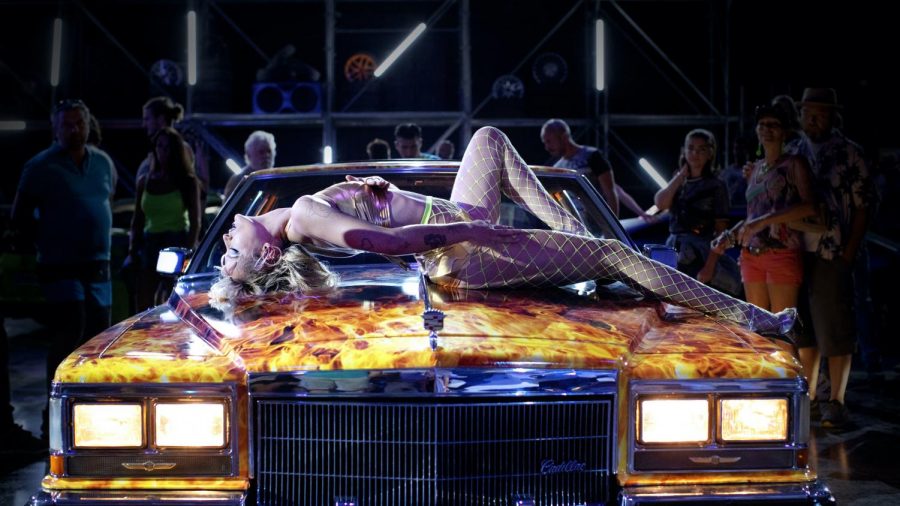Review: ‘Titane’ is a gnarly body horror journey
Julia Ducournau avoids the sophomore slump as the latest winner of the Palme d’Or award.
“Titane,” Julia Ducournau’s second feature film is an unconventional and thrilling success. With the film, Ducournau has become the second woman ever to win the Palme D’Or. (Image courtesy of Neon)
October 14, 2021
Spoiler warning: this article contains spoilers for “Titane.”
“Titane” is a historic achievement. With only her second feature film, director Julia Ducournau is the second woman to win the Palme d’Or. Not only did she win the highest prize in the international film world, she did it with a brash, challenging body horror thriller instead of a conventional drama.
The main character is known as both Alexia and Adrien (Agathe Rousselle), but I will refer to her as Alexia. She has quite the unorthodox relationship with cars. As a child, she was in an accident that gave her a long scar above her right ear. Now in her early 30s, her job consists of erotically dancing on luxury cars to attract the interest of playboys. One night after work, she goes inside the car she was dancing on that day, innuendo intended. Later, Alexia is alarmed to find she’s been impregnated by the car. After discovering the pregnancy, her fear motivates her to leave her old life behind.
The film’s first act is its strongest. Sex and body horror are constantly alluded to. Alexia dry humps the car she’ll go all the way with as part of her routine. In a shower, Alexia’s hair gets caught on the nipple piercing of fellow dancer Justine (Garance Marillier). After their awkward meet cute, the two make out at a house party. Later, Alexia tries to bite Justine’s piercings off of her chest. This foreshadows the ways in which Alexia’s body will be warped by the end of the film, as well as the violence she’ll inflict on Justine and her friends. When Justine tries to approach Alexia’s lower half, where she’s found to be leaking car oil, Alexia stabs her to death. In captivating long takes, Alexia proceeds to kill the other people at the house party, blending visceral violence with well placed moments of comedy.
This rampageous act concludes with Alexia changing her appearance to avoid the authorities, with a face-altering scene in the bathroom akin to Amy Dunne’s in “Gone Girl.” Now, disguised as a guy, Alexia is taken in by a middle-aged firefighter, Vincent (Vincent Lindon) who believes her to be his long lost son. This jarring transition of location and characters is appropriate for a film about drastic bodily transformation.
The remainder of the film shows Vincent attempting to integrate his son into his life, teaching him to become a firefighter and forming friendships with the other members of the station. Alexia tries to keep her secret hidden, but as her pregnancy progresses, it becomes more difficult to tape down her chest and stomach. As oil oozes out of her breasts and her stomach rips to reveal metal plating underneath, the dramatic irony of Alexia’s situation is coupled with the paranoia and fear of not knowing what is happening to her body.
Eventually, Vincent finds out about her secret, but he doesn’t freak out. He’s not in the greatest position to judge: he injects his ass cheeks with drugs every night in hopes of retaining his masculinity. Even if she’s not who he thought she was, she’s still someone for him to love — which he hasn’t had in a long time — though he rejects her sexual advances towards him. This love goes both ways, as Alexia opts to stay at the fire station despite encountering opportunities to leave. They’ve come to need each other, regardless of how bizarre the situation may seem to an outsider.
When Alexia is ready to give birth, she goes to Vincent, who aids her through the whole delivery process. Here, we see the culmination of their uncompromising love for each other. The film ends after Alexia’s child is born. Her body is now destroyed and unrecognizable. Vincent holds the child wrapped in bedsheets, and once he lies down, he takes them off to reveal the baby’s metallic spine.
While Ducournau’s debut feature, “Raw,” showcased her ability to slowly build up visceral visuals, “Titane” berates the audience from scene one. Both films are about anxiously awaiting a final transformation, but Titane’s build up is a different, unexpected unease. “Raw” slowly builds up to powerful imagery when the film is the most violent. In comparison, “Titane” opens so strongly that the audience is left wondering how the final image could be any more insane than the inciting incident. Ducournau is less concerned about satisfying audience expectations than she is about challenging our perceptions of violence in film. Per body horror master David Cronenberg’s film “Videodrome,” Julia Ducournau has created “the new flesh.”
Contact Sebastian Zufelt at [email protected].















































































































































